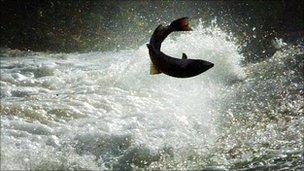Inspections reveal 'sea lice breaches' in salmon farms
- Published

The reports relate to inspections of Scottish salmon farms over the past two years
Official inspections of Scottish salmon farms have raised concerns over high levels of sea lice and the proper containment of fish, a report claims.
The Scottish government Fish Health Inspectorate reports were obtained by the Salmon and Trout Association.
The anglers' body said there were 68 instances of fish farms having sea lice above recommended threshold levels.
However, the Scottish Salmon Producers' Organisation said the figures had been misunderstood.
A Scottish government spokesman said the data used in the report "highlighted the rigour of its regulatory regime".
The Salmon and Trout Association claimed the reports showed the "true extent" of the threat to wild fish conservation from salmon farms.
Guy Linley-Adams, who compiled the dossier and is solicitor to the association's aquaculture campaign, said the information "gives the lie to the bland reassurances we are given by the salmon farming industry that the industry is properly regulated".
He added: "The devil is in the detail - now we have seen at least some of that detail and it is not pretty, revealing the true extent of the threat to wild fish conservation from sea lice emanating from Scottish salmon farms."
'Misshapen cages'
The reports, obtained under freedom of information laws, relate to inspections of Scottish salmon farms over the past two years.
A total of 52 fish farms were found to have sea lice-related issues, such as damage or deaths caused by the parasites.
In 48 cases, farms were not recording sea lice numbers in accordance with industry standards.
Concerns were also raised relating to the proper containment of farmed fish, such as the presence of misshapen cages and nets with holes or tears.
The anglers' association is calling for Scotland to follow the lead of Norway by making it compulsory for fish farms to publish a weekly sea lice count.
It claims fish bred in cages are spreading the parasites, causing a decline of wild salmon.
Paul Knight, chief executive of the association, said the inspections were carried out by prior arrangement, giving time for remedial action to be taken.
He added: "This dossier lays bare the reality of what is happening on Scotland's marine fish farms.
"The breaches of the industry's own Code of Good Practice are so widespread as to call into question the code's basic credibility."
'Public confidence'
Scott Lansburgh, chief executive of the Scottish Salmon Producers' Organisation, said: "Yet again, the S&TA has failed to understand the figures which demonstrate extremely high level of compliance, ranging between 85% and 95%.
"Salmon farming works within strict guidelines applied by regulators and the law.
"The industry has ambitions for sustainable growth and plans are being constructed, in consultation with regulators and the Scottish government."
He said more than one million salmon meals were eaten in the UK every day.
"The public confidence is there," he said.
"UK PLC, the retailers of the United Kingdom, support us whole-heartedly so we can't be doing terribly much wrong.
"This is a campaign that has been orchestrated, that has been going on for years and years.
"There's no food production industry dealing with live animals that doesn't have certain issues it has to deal with.
"But we do our level best and are continuing to do - investing in a lot of research into all sorts of developments to mitigate against sea lice, and all the rest of it, to improve our performance."
The salmon farming industry had made significant progress in the past 20 to 30 years, he added.
A Scottish government spokesman said: "Under the Strategic Framework for Scottish Aquaculture proposals are being taken forward to further strengthen sea-lice control, while also bringing forward new statutory technical standards for fish farm equipment to minimise escapes.
"Indeed, in 2010 reported escapes were at their lowest level since statutory reporting was introduced in 2002."
- Published28 January 2011
- Published14 December 2010
- Published24 June 2010